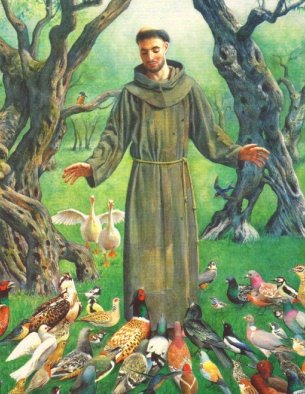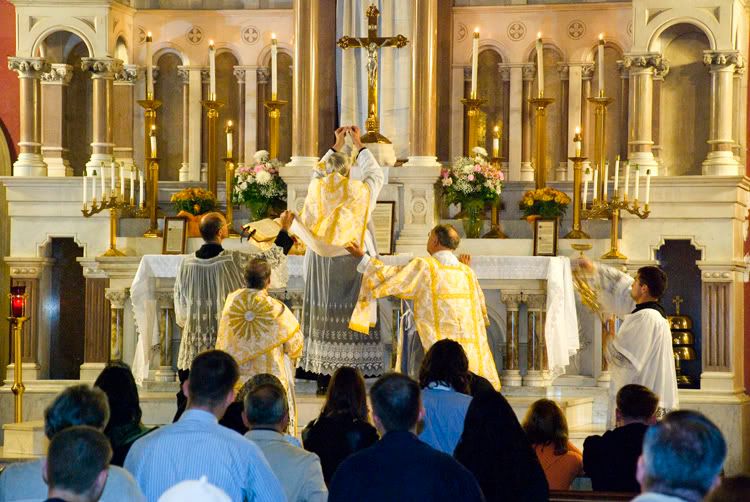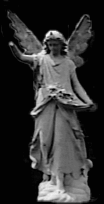The Feast Of St. Francis Of Assisi

Francis was born in Assisi in Umbria, in the year 1181 or 1182
As a youth he was ardent in his amusements and seemed carried away by the mere joy of living, taking no interest at all in his father's business or in formal learning. Bernadone, proud to have his son finely dressed and associating with young noblemen, gave him plenty of money, which Francis spent carelessly. Though Francis was high-spirited, he was too fastidious to lead a dissolute life. It was the age of chivalry, and he was thrilled by the songs of the troubadours and the deeds of knights. At the age of twenty or thereabouts, during a petty war between the towns of Assisi and Perugia, he was taken prisoner. During a year of captivity he remained cheerful and kept up the spirits of his companions. Soon after his release he suffered a long illness. This he bore with patience.
On the feast of St. Matthias, in 1209, the way of life he was to follow was revealed to him. The Gospel of the Mass for this day was Matthew X, 7-19: "And going, preach, saying The Kingdom of Heaven is at hand.... Freely have you received, freely give. Take neither gold nor silver nor brass in your purses . . . nor two coats nor shoes nor a staff.... Behold I send you forth as sheep in the midst of wolves...." These words suddenly became Christ's direct charge to him. His doubts over, he cast off shoes, staff, and leathern girdle, but kept his rough woolen coat, which he tied about him with a rope. This was the habit he gave his friars the following year. In this garb he went to Assisi the next morning and, with a moving warmth and sincerity, began to speak to the people he met on the shortness of life, the need of repentence, and the love of God. His salutation to those he passed on the road was, "Our Lord give you peace."
In June, 1224, Francis attended his last chapter meeting, at which the new rule was formally delivered to the provincial ministers. In August, with a few of the brothers closest to him, he made his way through the Apennine forest to the peak of Alvernia, a place of retreat put at his disposal years earlier by the lord of Chiusi. A hut of branches was built for him, a little way from his companions. Brother Leo daily brought him food. His fears for the future of the order now increased and reached a climax. And here it was, on or about Holy Cross Day, September 14, that at sunrise, after a night of prayer, he had a vision of a winged seraph, nailed to a cross, flying towards him; he also felt keen stabs of pain in hands, feet, and sides. The vision vanished, and he discovered on his body the stigmata of the crucified Christ. During his lifetime, few persons saw the stigmata, called by Dante, "the ultimate seal." Thenceforth he kept his hands covered with the sleeves of his habit, and wore shoes and stockings. To those who were there with him, he disclosed what had happened, and within a few days composed the poem, "Praise of the Most High God."
Because the body was meant to carry burdens, to eat scantily and coarsely, and to be beaten when sluggish or refractory, Francis called it Brother Ass. When, early in his new life, he was violently tempted, he threw himself naked into a ditch full of snow. Again when tempted like Benedict he plunged into a briar patch and rolled about until he was torn and bleeding. Yet before he died he asked pardon of his body for having treated it so cruelly; by that time he considered excessive austerities wrong, especially if they decreased the power to labor. He had no use for eccentricity for its own sake. Once when he was told that a friar so loved silence that he would confess only by signs, his comment was, "That is not the spirit of God but of the Devil, a temptation, not a virtue."
The order which Francis founded divided early into three branches, the Brothers Minor of the Observance, who follow the rule of 1223, preach, perform works of charity, and go as missionaries abroad, the Brothers Minor Conventual, who live by the later, less stringent rule, which permits the corporate holding of property, and the Brothers Minor Capuchin, for whom Francis' rule is not ascetic enough, and who live strictly cloistered, under a regimen of silence.
"Little Flowers of St. Francis", first printed in 1476, contains stories of Francis' love of the poor, of animals, of all nature.
 SACRED HEART CHURCH NEW HAVEN, CONNECTICUT
SACRED HEART CHURCH NEW HAVEN, CONNECTICUT













 Official Mascot of The League of Warm & Fuzzy Traditionalists
Official Mascot of The League of Warm & Fuzzy Traditionalists







0 Comments:
Post a Comment
<< Home